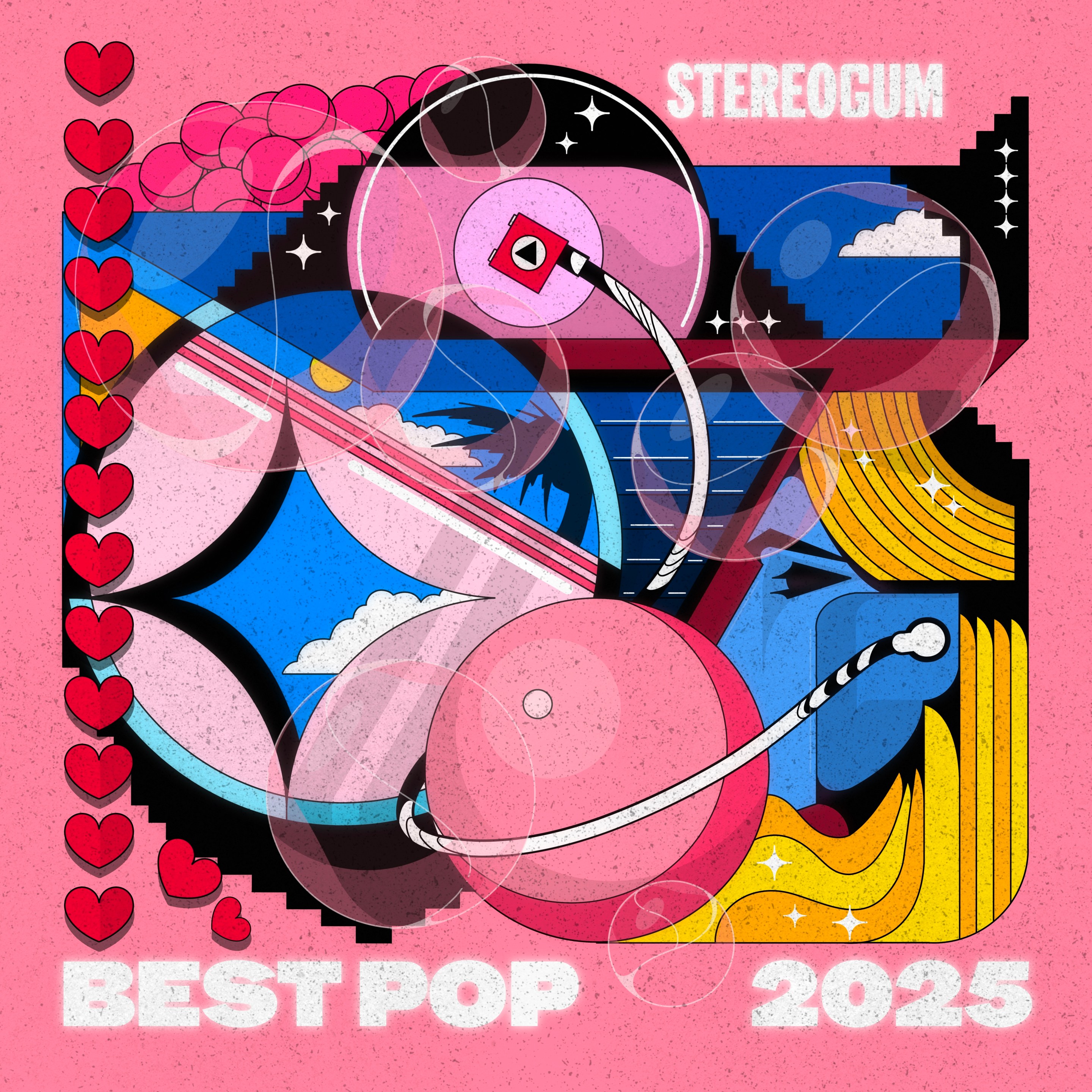Like the subject of its lead single, Dua Lipa's Radical Optimism comes and it goes, a quick pop workout that immediately does a Houdini-like escape act from staying power. The record is a frustrating listen: an album that it's hard to find anything really wrong with, that's packed to capacity with inarguable bangers, but that feels so, so inessential.
Part of this is timing. Dua dropped her album immediately after the biggest pop star in the country dropped hers; and while that's something she and her team realistically might have seen coming, nobody could have predicted that the two biggest rap stars in the country would turn their everyday feud into a seven-game series of magnetic hate mere days afterward. It doesn't help that these bookending events are both musical and gossip supernovas, endlessly talkable about, while (as some have pointed out) Dua Lipa has few musical surprises and no gossip angle whatsoever. Part of it could be inflated expectations. In retrospect, the COVID lockdowns made Future Nostalgia feel more like an Event Album than it maybe was. A dance record that would normally be just a dance record, and was conceived as just that, suddenly became a statement on resilience and recreating the closed-off communal joys of the club, just real radical optimism. Would the same have happened in 2024?
And Dua did herself no favors promoting Radical Optimism with one of the most baffling PR blitzes of the year. After telling publications like Rolling Stone that she was "done being a mystery," she immediately started building another mystery by teasing that her new record was inspired by Britpop and UK rave groups, then leaving critics – the likely intended audience for this stuff, unless there's a burgeoning zoomer Primal Scream stanbase I'm unaware of – to puzzle out what the hell she meant. To be fair, this gap between stated inspirations and recorded reality is extremely standard in album promo. But at least when Dua Lipa promoted Future Nostalgia, the artists she mentioned made sense: Jamiroquai, Prince, Madonna. You can draw a line from "Levitating" to Madonna easily, but it takes some real Pepe Silvia work to figure out what on Radical Optimism could possibly sound like Massive Attack. Even as a Massive Attack stan of 15+ years, predisposed to hear them anywhere… how? Half these songs would sound great with the "Unfinished Sympathy" beat (most songs would). Maybe "These Walls," being as it is about a toxic relationship, could be "Inertia Creeps"... if "Inertia Creeps" was not cerebral or claustrophobic but airy and cheerful, like a jingle for a iced-tea commercial.
The broad genre inspirations aren't much easier to locate. "Neo-psychedelia" seems to mostly mean the presence of Tame Impala. "Rock" seems to mostly mean occasionally raspy vocals. "Falling Forever" has such vocals and also uses the "Running Up That Hill" beat, and Kate Bush just got inducted into the Rock & Roll Hall of Fame, which… counts as rock, maybe, secondhand? Bush seems to be an actual, deliberate inspiration here – the soprano backing vocals throughout the record evoke her, and the teaser for "Houdini," in which Dua tongues a metal key, is a direct reference to the cover of The Dreaming and its song of the same name. So why not mention her instead of Blur? Does the beloved pop icon with newfound Stranger Things-buoyed popularity not enjoy the same cultural cachet as (checks notes) Oasis?
The whole thing comes across as an attempt to impose big important stakes onto a recording that was never meant to support them. Dua Lipa is a singles artist, and that's fine! She is great at singles, and Radical Optimism excels at being what pop albums were for years: a delivery mechanism for huge songs. Dua Lipa's musical evolution has been heavily overstated; her sound and schtick have not changed much since her debut album, nor did they need to. Most of Radical Optimism is written with Caroline Ailin, the UK songwriter behind "New Rules," and producers Danny L Harle, Tobias Jesso Jr., and Kevin Parker are happy to subsume their respective sounds into dance crossover. The sequencing is a bit off – Lipa's admittedly formidable vocals crowd every free second on the record, including those of intros and outros – but that doesn't matter when listening to these songs in isolation. There are little joys everywhere, like the "Escapade" chimes in "Whatcha Doing," the She'kspere-producing-Destiny's Child guitars on "French Exit," the teasing spoken-word bits on "French Exit" or "End Of An Era," Parker jamming on the sequencer wherever he can, and my personal favorite, the Mother 3-type flute breakdown in "Maria." (If Dua Lipa gets to read things into these tracks that weren't intended, so do I.)
The lyrical throughline to Radical Optimism is also a Dua Lipa mainstay: songs that talk about relationships not in terms of emotional catharsis but best practices. When an ex occupies too much of her partner's headspace, Lipa's response is not to rage at the woman's existence, nor envy or subliminally lust for her as on "Jolene" and its many imitators, but thank her for being a healthy influence. "These Walls" is like a Carrie voiceover from Sex And The City, the only possible medium where it'd make sense to take relationship advice from architecture. Even the songs where Lipa addresses her own self-protective tendencies, like "Houdini" and "French Exit," aren't rueful confessionals or the kind of unrepentant player anthems the likes of Weeknd have written dozens of, but more like a therapy sesh about the avoidant attachment style.
A lot of people are into this kind of relationship dissection! A lot of people are into disco, too, and despite Dua Lipa's protests, she is very good at it. (Lipa's offense at her disco tracks being called disco are yet another puzzling thing about this record's promotion; "Illusion" in particular is the best disco cut by a main pop girl since Chromatica’s "Enigma.") Another term for "radical optimism" is "benefit of the doubt," and this record is much improved when given that. And I'm sure most of these singles, 10 years later, will enjoy plenty of future nostalgia.
POP TEN
Tommy Richman - "Million Dollar Baby"
Tommy Richman has done the utterly impossible: a relative unknown (he's affiliated with Brent Faiyaz) hitting #2 on the Hot 100 practically out of nowhere, in the runoff of a Taylor Swift album release week, as well as Drake and Kendrick Lamar vacuuming up YouTube streams. Some arcane marketing magic was cast here, but you can't pull off that powerful a spell without good stuff in the cauldron: Richman's falsetto, the Jimmy Jam and Terry Lewis cowbell, and slick funk with massive summer jam potential.
Normani - "1:59" (Feat. Gunna)
The Fifth Harmony artist returns from years of absence and not-particularly-well-hidden PR trouble (for which she's taken a lot of fairly undeserved shit) not with a sweaty, frenetic track like "Motivation," but a slow jam in the mode of her massively underrated "Waves." She's excellent in this mode, despite it sounding more like a low-key fourth single than The One Big Hit to break her out of her de-facto hiatus. I hope I'm proven wrong.
ILLIT - "Magnetic"
I am more than OK with every K-pop song sounding like NewJeans for the rest of eternity. The magnetism of "Magnetic" is light and free-flowing, like the kinetic magnetized sand you might have played with in elementary school. I particularly like the bit in the bridge where "Magnetic" almost turns into G-funk.
Bruses - "Bestia" (Feat. Humbe)
Mexican singer-songwriter Amalia Ramírez has been making atmospheric pop for years and has the industry buzz to show for it. "Bestia," a team-up with Latin Grammy-winning R&B artist Humbe, goes huge but surprisingly understated; the track makes airhorns and quasi-Jersey club breakdowns sound brooding and moody. I would believe that this song was inspired by UK rave and Massive Attack.
Dasha - "Austin"
(Not that Dasha.) We officially live in a post-Cowboy Carter world, where artists are getting their big break not by crossing over from country to pop but the other way around. Anna Dasha Novotny used to make straight-ahead pop – "Talk" is particularly great (and has more rock than Radical Optimism), but country's a great fit for her too. On "Austin," she's full of Kelsea Ballerini-esque pluckiness as she eviscerates a dude for bailing on her cross-country getaway.
Emmerson - "Stick To The Plan" (Feat. Lola Brooke & Howard Hewett)
Emmerson, one of what's sure to be a panoply of Afropop-R&B crossover artists, rides a can't-lose Shalamar sample here, but crucially, producer Sean2 Miles deploys it in a lowkey, ungimmicky way. (I do miss the percussion, though.)
BIBI & Jackson Wang - "Feeling Lucky"
From 88rising's K-pop marketing machine, whose hit-to-miss ratio is consistently, diabolically great, comes a duet with a propulsive groove and a video positively packed with sultry UST. (And yes, it also rocks harder than Radical Optimism. We must have perspective.)
Young Miko - "Princess Peach"
Young Miko, a rising Puerto Rican rapper, showcases a relaxed flow with chill PinkPantheress charm, as well as a knack for alchemizing an attention-grabbing title into saucy innuendo. I mean, we now have a Princess Peach pop pantheon: Baby Queen, Mario Strikers Charged, this.
Kehlani - "After Hours"
Another can't-lose sample here, this time the beat from Nina Sky's "Move Ya Body." (Which makes at least two Nina Sky tracks called "After Hours.") But Kehlani's ear for R&B hooks is strong as ever, and she grafts her own huge hook on here.
Kendrick Lamar - "Not Like Us"
It had to be done. I'd be a complete goddamn liar if I put together a roundup of the month's singles without including the song I have already listened to more than anything else this spring. You know what this sounds like, and if you don't, you most likely will soon because this would sound enormous in any year.
CLOSING TIME
@tonystatovci Bro protecting his peace ?? / links in my bio check me out ?
♬ Here Comes the Sun - The Beatles Revival Band
Stereogum is an independent, reader-supported publication. Become a VIP Member to view this site without ads and get exclusive content.






